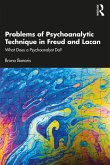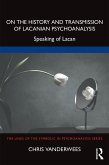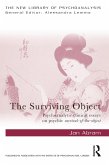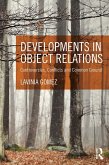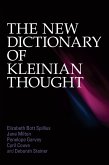Beginning with his own history, at first avoiding psychoanalysis before training as a Lacanian, Parker moves on to explore the wider historical development of clinical practice, making an argument for the importance of language, culture and history in this process. The book offers commentary on the key schools of thought, and how they manifest in the practice of psychoanalysis in different regions around the world.
Psychoanalysis, Clinic and Context will be of great value to practitioners and social theorists who want to know how psychoanalytic ideas play out in training and the clinic, for trainees and students of psychoanalysis or psychoanalytic psychotherapy, and for the general reader who wants to know what psychoanalysis is and how it works.
Dieser Download kann aus rechtlichen Gründen nur mit Rechnungsadresse in A, B, BG, CY, CZ, D, DK, EW, E, FIN, F, GR, HR, H, IRL, I, LT, L, LR, M, NL, PL, P, R, S, SLO, SK ausgeliefert werden.
"Ian Parker's wide-ranging discussion of psychoanalysis in international contexts is dazzling in approach, tonality, and themes and presents readers with a history of the problems of response and change. Parker gives us a new approach to the psychoanalytic field through his longstanding development and this is a major contribution." -Professor Deborah Britzman, FRSC, York University, Canada
"From his student years, Ian Parker began searching for alternatives to the shortcomings of mainstream psychology, and this book is the riveting story of how he grappled with the complex diversities of psychoanalytic thought, eventually becoming a Lacanian analyst himself. Parker's erudite and pellucid prose makes this essential reading for anyone pondering the persisting potential and possible pitfalls of deploying psychoanalytic narratives, especially in political contexts, as he takes us on rollicking journeys through Brazil, Korea, Russia and Japan, while debating with queer theory, Judaism and Islam along the way." --Professor Lynne Segal, Birkbeck, author, Radical Happiness: Moments of Collective Joy





